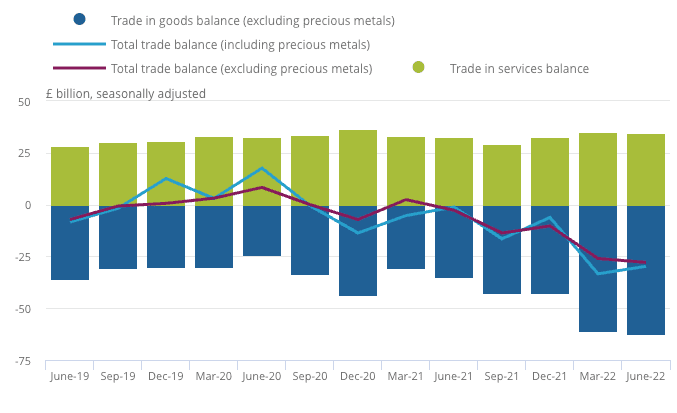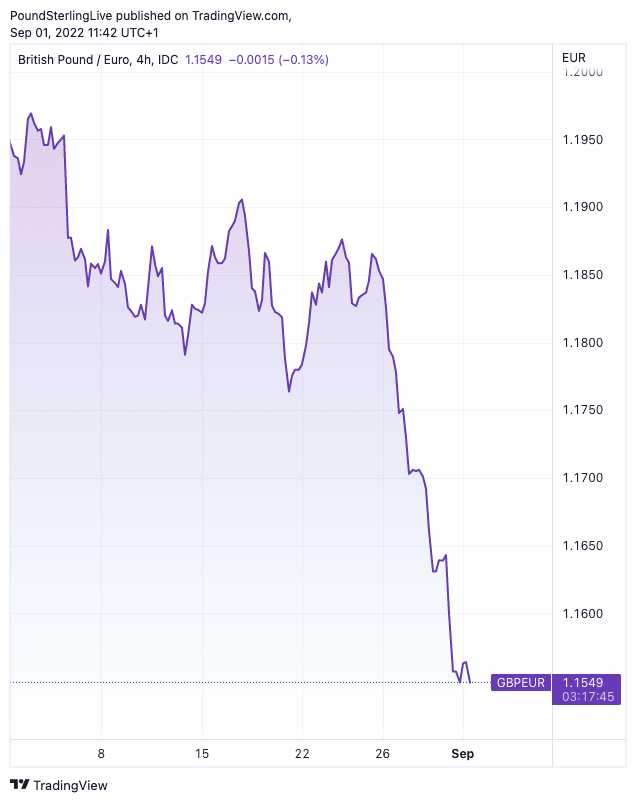GBP/EUR Rate Going Lower says Soc Gen Analyst
- Written by: Gary Howes

Image © Adobe Images
The value of the Pound against the Euro has fallen sharply over recent days and is now at levels last seen in June, and one analyst says there is little reason to expect an improvement over coming weeks or months.
Kit Juckes, head of foreign exchange research at Société Générale, says at the start of September the Pound will continue to be besieged by a wall of worry.
These include the rising cost of servicing UK debt and the country's dire trade situation, a legacy of decades of reliance on energy and goods imports.
The Pound struggled in August with the lacklustre performance blamed by analysts on concerns the UK's debt burden will increase as the incoming government seeks to cushion against the impact of the cost of living crisis.
This as the Bank of England hikes interest rates, forcing up the yield paid on UK government debt, known as gilts. During the Covid crisis the government could comfortably ratchet up its borrowing as the Bank of England offered record-low interest rates and actively bought government debt as part of its quantitative easing programme.
The Bank will however now start actively selling government debt and could hike rates by a further 50 basis points in September, severely limiting the government's borrowing potential as the country faces yet another crisis.
"Sterling has been helped by rising short-term rates in recent weeks. However, with more and more ECB council members pushing the idea of a 75bp hike next week, sterling's support is waning. Meanwhile, higher Gilt yields aren't so helpful when people see them as the price the UK pays to suck in huge amounts of money needed to balance the budget in the months/years ahead," says Juckes.
Compare Currency Exchange Rates
Find out how much you could save on your international transfer
Estimated saving compared to high street banks:
£2,500.00
Free • No obligation • Takes 2 minutes
The UK budget will come into focus again in September with the announcement of a raft of special measures by the government, aimed at supporting households and businesses amidst surging energy price rises.
The fear is that an unsustainable surge in borrowing could pressure the cost of servicing debt, making UK assets increasingly unattractive to foreign investors.
It is this foreign investor demand that is meanwhile a key source of support, or pressure, for the Pound.
The Pound to Euro exchange rate (GBP/EUR) is down 1.85% already this week, taking it to levels last seen in June.
The pair is quoted at 1.1563 at the time of writing, ensuring bank accounts are quoting in the region of 1.1334 for euro payments and independent providers are offering around 1.1530.
"The UK economy is in recession, the balance of payments is catastrophic and more/faster rate hikes won't do much to restore confidence," says Juckes.
Above: The UK's balance of payments account shows a deficit in the country's trade position, this should provide a fundamental drag on the Pound, according to analysts. Image source: the ONS.
Next week will see the winner of the Conservative Party's leader selection process announced, at 12:30 BST September 05, they will be installed as Prime Minister soon after, on September 06.
Markets will be keen to hear what the new leader will do to address the current energy crisis, credibility here could boost Sterling.
Falling European gas prices are meanwhile assisting the Euro which suffered tremendously as prices rocketed amidst restricted gas flows from Russia and frenzied demand by EU countries looking to bulk up their reserves in time for winter.
European storage levels are now well ahead of target this bidding pressure and speculative activity appears to have eased off, letting prices drop accordingly.
The Eurozone's trade surplus rapidly turned to a deficit over recent months as global demand for Eurozone exports dried up and the cost of importing energy surged.
But easing energy prices should contain this, and ultimately allow the region's balance of payments situation to improve.
Juckes says the region's balance of payments will remain favourable and this can help the Euro going forward.
Above: GBP/EUR at four hour intervals. Stay on top of the market, set your FX rate alert here.
"In times like this, Europe's strong balance of payments position makes a big difference, as higher yields and a battered euro will persuade European investors to keep more savings at home," he says in a note out Monday.
"The UK's worse economic outlook, current account deficit, and political frailty all suggest we may now get more divergence as EUR/GBP rises," he adds.
A 75 basis point rate hike at the European Central Bank (ECB) is meanwhile credited by analysts as a further source of support for Euro exchange rates at the start of September.
"With inflation in the Euro area quickly approaching double digits, the ECB may indeed need to act more forcefully at next week's gathering than it did last time. Thus, euro traders maintained bets with regards to a 75bps rate increase," says Charalampos Pissouros, Senior Investment Analyst at XM.com. "The common currency could continue its recovery path."
Compare Currency Exchange Rates
Find out how much you could save on your international transfer
Estimated saving compared to high street banks:
£2,500.00
Free • No obligation • Takes 2 minutes






